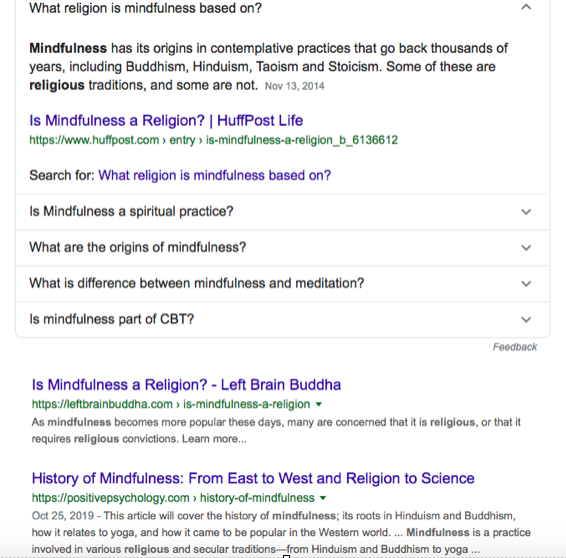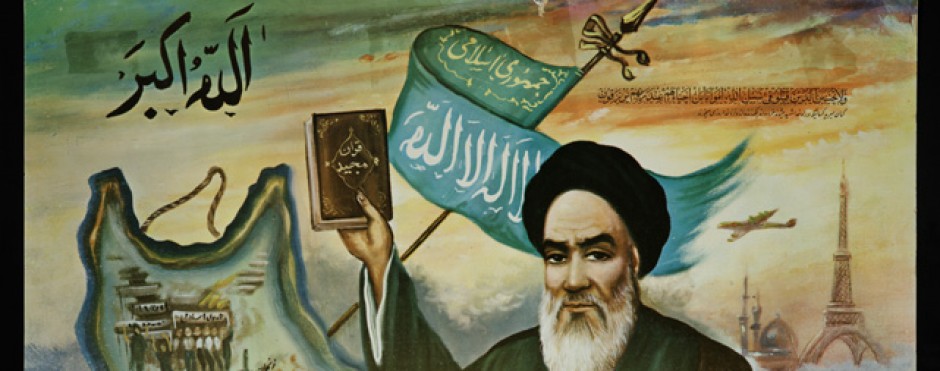Visit the University of Vermont’s Wellness Environment, and you’re sure to see students being guided through a group yoga flow on the green and practicing mindfulness through meditating in their “Healthy Brains: Healthy Bodies” class. Step inside any mental or physical health center in this country, and you’re likely to find pamphlets and posters promoting or advertising Buddhism-inspired mindfulness meditation practices for improved wellbeing. Upon taking a step back to look at the western fascination with these models of wellness, we can see the ubiquitous influence of Buddhist practice on our efforts to focus on bettering our mental health. But can anyone imagine what it would be like if Islamic practice was being endorsed in an even slightly comparable way? Islam is not present in this growing American prevalence of “eastern” practice, despite similarities in philosophy and certainly in mental health benefits. A closer look at Sufism, a mystical form of Islam, and the way that mindfulness-based therapy is an integral piece —like muraqaba (literally “mindfulness”: Sufi meditation)—can help us question our understanding of Buddhism as a universally applicable practice, but not Islam.
To start my thinking about this, I wondered where this discrepancy of notions of applicability even came from. We (“the west”) have to look at these origins within the framework of our own interpretations of eastern religions. Tomoko Masuzawa, in her The Invention of World Religions, explains how Buddhism has been historically recognized by us as an Aryan tradition, and therefore more compatible with western ideology than Islam, which we’ve seen as a “prototypically Arab—hence Semitic—religion.” (179) So Buddhism “naturally” seems more easily welcomed and adaptable into our own practices. Islam, however, has always been seen as its own other world, separate and often in supposed direct conflict with our beliefs and values.
Instead of Buddhism’s prevalence in our mental health culture turning out to be a result of actual greater applicability, it turns out that the lack of Islamic practice overlapping with ours is just due to racism. Looking at Sufism as a more in-depth study, I want to investigate the real world of Islamic spirituality and health, and hopefully uncover the falsity of our assumptions that Muslim practice is so at odds with universal values and needs.
Sufism, or tasawaf, is rooted in a deeper understanding of the self and achieving a connection with a love greater than oneself. For Sufi Muslims, this idea is centered around the concepts of the nafs. Training the nafs works for Sufis as a method of alleviating emotional distress. These nafs are false pride, greed, envy, lust, back biting, stinginess, and malice. One of the major meditative goals is to overcome these nafs to achieve a state of awakening and forgiveness for the sins we all commit. Ultimately, this achievement leads to “The Contented Self”, which is a state of accepting all that happens and living in the moment, rather than the past or future. At this state of a peaceful spirit, a person is relieved of concern for material values and everyday problems. This state is ultimately achieved by controlled breathing, muraqba, and can incorporate healing music and dancing or art. (Irfan 2017).
For example, Mohammad Din, a Malay artist and mystic spiritual healer, incorporates art, calligraphy, martial arts, medicine, and nature (to him “all part of the One”) as a holistic approach to healing problems of the soul. He makes deeply moving art that people may use as a symbol of protection when they are sick. The usage of his art in such a way, combined with his intense devotion to staying by his patients’ sides through his healing of their ailments, underlines the importance of real human connection and focusing on a patient’s whole self and spirit—not just the matters of parts of the physical body—in healing (Farrer 2008).
Take Sufi meditations on death as a broader example. To make sense of death, one meditates by looking at the bigger picture, so to speak, of the temporary nature of life itself. This practice, while it may seem dismal, is actually quite uplifting for those who engage in it. By focusing on this larger view, the frivolities of one’s life are put into perspective, and everyday anxieties can be alleviated. Al-Ghazālī, a Muslim theologian and mystic, once suffered from a debilitating panic attack when he was giving a lecture that left him robbed of his ability to speak. Meditating on death in this way allowed him to ease his anxieties, and recover from his malady. (Perriera 2010). Death is an inevitable, deeply universal and human phenomenon that people of all cultures will ultimately experience. Using this concept as a form of meditation can not only makes us more comfortable with its reality, but could also be helpful for anyone who suffers from anxiety.
In perhaps the clearest illustrations of all, it was Muslim psychologist Abu Zayd Ahmed Ibn Sahl al-Balkhi who founded Cognitive Behavioral Therapy in the tenth century. Today, CBT is increasingly being used around the world to treat individuals who suffer from anxiety and depression, among other mental health disorders. Another influential Sufi figure was Jalāl ad-Dīn Muhammad Rūmī, whom the world knows as Rumi. A Sufi mystic and poet, his teachings are widespread in their influence of Sufis today. He emphasizes awareness of the breath on calming the spirit. One key concept from his teachings is the idea of walking meditation, during which one may center attention on the feet, and breathing into them as one walks. This practice’s wisdom is grounded in the universal relevance of breath and walking in the human experience (Mirdal 2012).

In working through my research for this post on mindfulness and Muslim spirituality, I encountered more of a struggle than I’d anticipated. You can see in the above Google search results of my attempt to research mindfulness. Buddhism is mentioned plenty, but Islam is left out of the picture. So why is this significant? The lack of information on Islamic spirituality and its connection to mindfulness—apparent in a simple Google search—reveals how western scholarship and understanding neglects to accept Islam as compatible with our notions of mental health.
Our understandings of religion and mindfulness, and what we do or don’t see as applicable to western practice, are rooted in our prejudices against Islam and Muslims. Acknowledging which non-western spiritual teachings we do and don’t accept into and preach throughout our own health culture reveals plenty about our ignorance, and our failure to embrace cultures that seem too different from ours, when they have such related values at the root. When we put our western biasses towards Islam aside and focus our attention towards understanding actual Muslim practice, we can see that Buddhism isn’t the only ideology with universally applicable elements. Taking time to look beyond our assumptions about which traditions “work with” us and exploring those more ostracized by our society can be incredibly insightful. That’s why sufism is a great example of a way to discover the connections we really have in how we as humans want to care for ourselves and our minds. Mental health is at the base of human experience; it connects us all. I believe that by starting like this with what connects us across cultures, we can begin to shorten the perceived ocean of distance between our understandings and Muslim understandings of the world we all live in.
Bibliography
Farrer, D. S. “The Healing Arts of the Malay Mystic.” Visual Anthropology Review 24, no. 1 (2008): 29-46.
Mirdal, Gretty. “Mevlana Jalāl-ad-Dīn Rumi and Mindfulness.” Journal of Religion and Health 51, no. 4 (2012): 1202-215.
Isgandarova, Nazila. “Muraqaba as a Mindfulness-Based Therapy in Islamic Psychotherapy.” Journal of Religion and Health 58, no. 4 (2019): 1146-160.
Perreira, Todd. “”Die before You Die”: Death Meditation as Spiritual Technology of the Self in Islam and Buddhism.” The Muslim World 100, no. 2/3 (2010): 247.
Irfan, Muhammad, Sofiya Saeed, Naila Awan, Riaz Gul, Mirrat Aslam, and Farooq Naeem. “Psychological Healing in Pakistan: From Sufism to Culturally Adapted Cognitive Behaviour Therapy.” Journal of Contemporary Psychotherapy 47, no. 2 (2017): 119-24.
Masuzawa, Tomoko. The Invention of World Religions or, How European Universalism Was Preserved in the Language of Pluralism. Chicago: Univ. of Chicago Press, n.d.
Ernst, Carl W. Following Muhammad: Rethinking Islam in the Contemporary World. Brantford, Ont.: W. Ross MacDonald School Resource Services Library, 2008.
Google search. Google. 3 November 2019.
